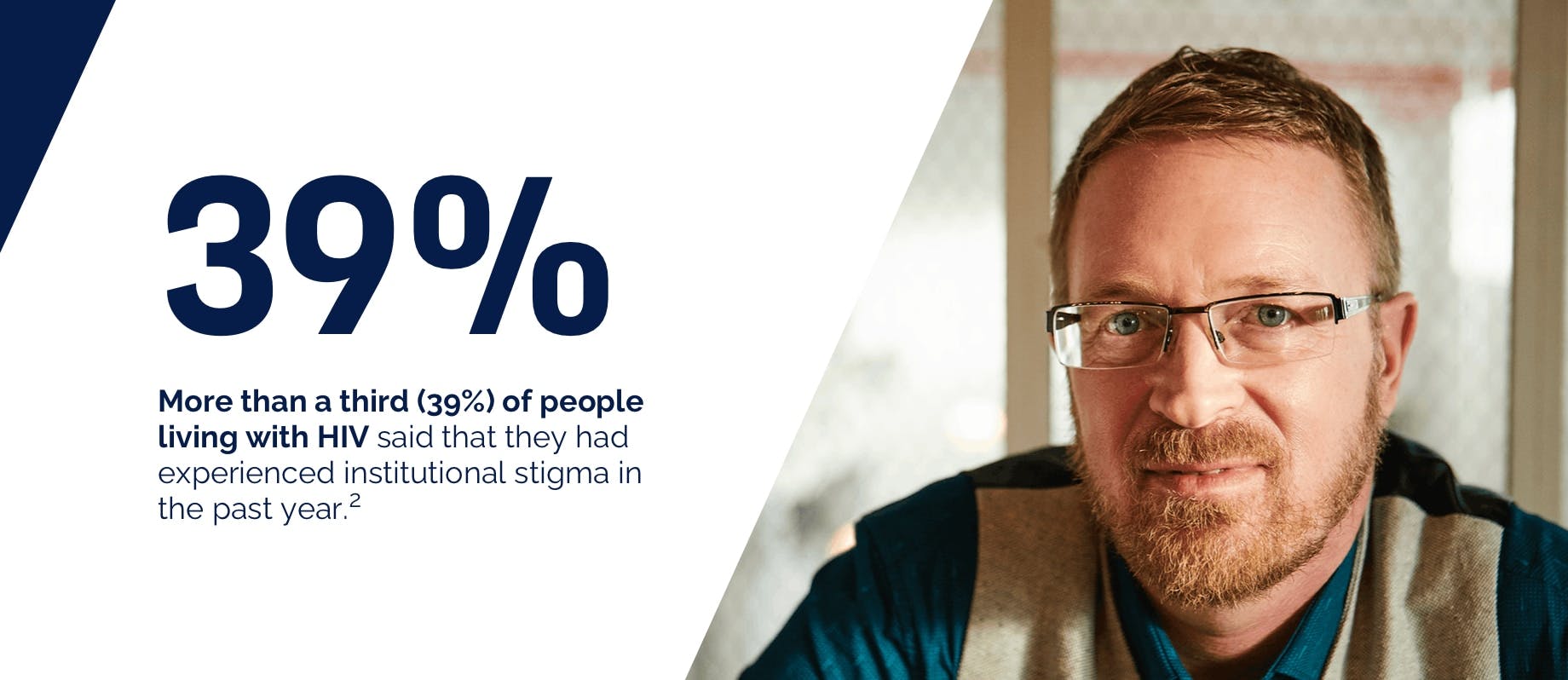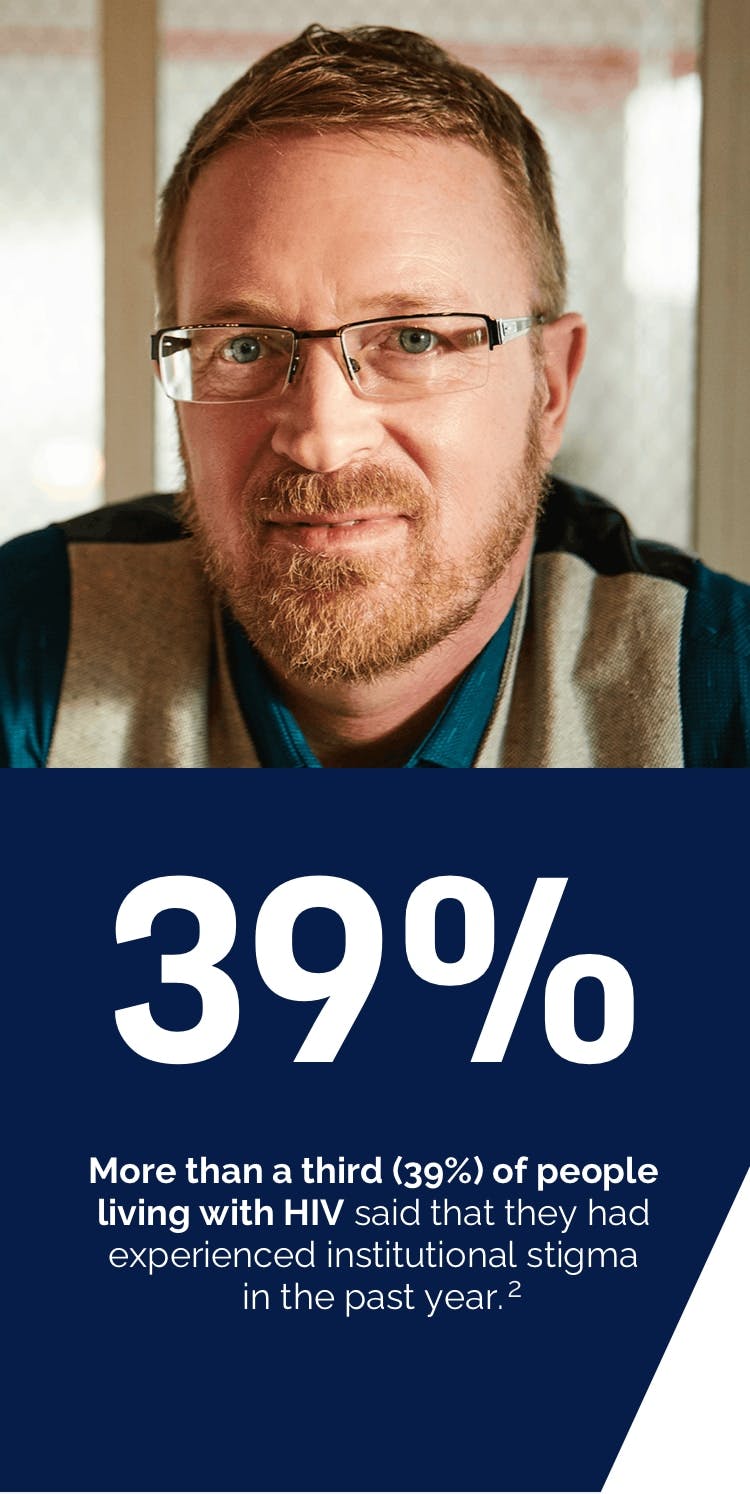AN INSIGHT INTO ORGANISATIONAL HIV STIGMA AND DISCRIMINATION

Much has been done to reduce discrimination at an organisational level through anti-discrimination laws, but this varies across countries. More needs to be done to ensure that legislative frameworks are being implemented and that stigma and discrimination is effectively addressed.
What did Positive Perspectives discover about organisational stigma?1
- More than a third (39%) of people living with HIV surveyed said that they had experienced institutional stigma in the past year (e.g., being denied jobs, visas, health services or education due to their HIV status).
- Nearly a quarter (24%) of those surveyed worried that their HIV status will change their relationship with their primary care provider.
- 15% of the people living with HIV surveyed admit to worrying all/a lot of the time that people at work will find out they have HIV and 11% say they worry all/a lot of the time about losing their source of income if people at work find out.
Defining organisational level HIV stigma
Organisational HIV stigma is stigma or discrimination that occurs during the interactions that people living with HIV have with institutions, such as workplaces, health services, religious or educational institutions (e.g. schools, colleges, etc.). This can also include the anticipation of stigma and discrimination.
These interactions are often with a person’s doctors, dentists, healthcare professionals, teachers, religious leaders and tutors; interactions which should feel safe and secure, as opposed to stigmatising.
“A dentist put on three pairs of gloves when he found out [I had HIV].”
HIV stigma and discrimination in healthcare
The fact that stigma and discrimination can impact willingness to be tested and/or seek care for HIV has been observed in many settings and is recognised by both the World Health Organization and UNAIDS as a barrier.
People living with HIV report experiencing stigma within the healthcare setting and from healthcare professionals. That’s why it is now widely accepted that, to improve access to healthcare services in the wider community setting, social stigma must be tackled.
Research has shown that healthcare professionals in some countries may seek to minimise contact with people living with HIV, delay or deny them treatment, demand additional payment for services and/or isolate people living with HIV from other patients.
“During my pregnancy I was only offered a vaginal examination twice. A gynaecologist rejected me completely.”
HIV stigma and discrimination in the workplace
Stigma and discrimination remain a barrier to employment for people living with HIV. It is thought to be felt most significantly by those who are unemployed and seeking work, but it is also a concern for those in work in terms of job retention and progression.
Employment rates for people living with HIV are consistently found to be below the national averages.
This is despite evidence that – with the right treatment and support – someone diagnosed with HIV in recent years should have a similar, if not the same, ability to work as someone without HIV.

The survey insights covered a wide range of potential discriminatory practices, from people feeling they must hide their status in the workplace, to issues affecting the ability to travel beyond the EU for work, or having trouble finding a dentist.
However, the survey also demonstrated that the proportion of people who worried that they would lose their job if they disclosed their HIV status with their employer was far higher than the proportion who had faced discrimination as a consequence of disclosing their HIV status, highlighting a potential issue with anticipatory stigma in the workplace.


Recommendations:
- Implement services to give equal access to work, education and healthcare services
Local services should be provided by government, the public sector and employers to support people living with HIV with access to work, education and healthcare services that are tailored to their needs. - Zero discrimination in the organisational setting
Specific measures to prevent HIV-related discrimination and stigma should be embedded within broader anti-discrimination written policies, practices and the culture in organisational settings, including in the workplace, education and healthcare. They should be monitored and implemented with zero tolerance of discrimination.
What can be done?
To support people living with HIV in work and/or education, and particularly in the healthcare setting, it is key that national and local governments, the legal system, employers, apprenticeship programmes and educational establishments all work in parallel to ensure that:
- Discrimination is not tolerated
- Proactive education is in place for employers and employees, and flexible working is available, where possible
- People living with HIV who are not in work have access to services and trained professionals who understand, and have empathy for, any specific needs of people living with HIV seeking education and/or employment
- Access to healthcare/support services is not restricted and healthcare providers are trained in addressing HIV-related stigma and discrimination
Our work towards combatting organisational stigma
Our industry-leading Positive Action programmes, initially created by GSK and now run through ViiV Healthcare, have been tackling HIV stigma for over twenty years; working with the communities most vulnerable to HIV with efforts spanning innovations in HIV care services, initiatives aimed at preventing HIV, building capacity in grassroots communities and addressing HIV stigma and discrimination.
Through the Positive Action Challenges, Community Strategic Initiatives and Breakthrough funding streams, we identify and fund innovative strategies to link priority populations to stigma-free services. Read more about our Positive Action strategy for 2020 – 2030.
In collaboration with Implementation Science we work at trying to understand which interventions are effective in addressing HIV related stigma in healthcare settings.
Through partnerships and campaigns, we are actively contributing to fighting HIV stigma and discrimination. Launched in June 2020, Gareth Thomas started the Tackle HIV campaign in partnership with ViiV Healthcare and the Terrence Higgins Trust (THT) after hearing first-hand how deeply stigma and self-stigma affect people living with HIV. ViiV is also an active participant in the THT back to work programme, supporting people living with HIV to reintegrate into the world of work.
Reference:
- Living beyond HIV: Taking a Positive Perspective
YOU MAY ALSO BE INTERESTED IN:
The Global Positive Perspectives Wave 2 Study is one of the largest, global, HIV patient-reported outcomes studies to date, involving 2,389 people living with HIV (PLHIV) aged 18-84 across 25 countries.
Data from the global Positive Perspectives study (Wave 2) highlight the unseen self-reported psychosocial impact that daily medication may have on some people living with HIV.
Advances in HIV treatment mean people living with HIV now expect longer life-expectancies. HIV care is no longer about just prolonging life, but also about ensuring good overall health-related outcomes.
NP-GBL-HVX-COCO-230013 September 2024
If you get any side effects, talk to your doctor, pharmacist, or nurse. This includes any possible side effects not listed in the package leaflet. You can also report side effects directly via the GSK Reporting Tool link https://gsk.public.reportum.com/. By reporting side effects, you can help provide more information on the safety of this medicine.
If you are from outside the UK, you can report adverse events to GSK/ ViiV by selecting your region and market, here.


